Music Reviews 2007
Amaretti Chamber Orchestra - Orchestral Concert

The Amaretti have established themselves as one of the finest string ensembles in the region and we were not disappointed with their return to this year's Fringe. They tend to concentrate on English composers which this year made up the first part of their programme.
They opened with Lennox Berkeley's Serenade for Strings Op 12. Composed shortly before the Second World War the music reflected the general anxiety about the future. This mood was very well caught by the orchestra..
Then a new work by Patrick Jones, head of music at the Metropolitan University entitled The grass grows tall. This lovely piece was written for Alan Bennett's Wind in the Willows. It is very much in the English tradition and clearly influenced by Tippet and Finzi. An added bonus; the composer was present and was invited to say a few words about the work. Amaretti are to be congratulated on including works by a living composer and it is hoped that they will continue to do that.
A brief acknowledgement of the Elgar celebrations with Chanson de Matin Op 15 and then a rarity - Gordon Jacob's Double Bass Concerto. Jacob had set out to compose pieces for the less fashionable instruments and this work is one of the results. The Amaretti are fortunate to have Diana Milner in their Bass section. Formerly Principal Bass with the Hallé she has the technical skill to play this demanding piece. Her performance was nothing less than a tour de force.
The programme concluded with the well known Serenade for Strings Op 48 by Tchaikovsky. Here we were treated to some really marvellous string playing. Moreover Louise Latham showed us what a wonderful conductor she is. She has the ability to emphasise, where necessary, the different sections of the orchestra so that we could gain a clear understanding of the composer's intentions.
Altogether a superb concert!
Peter Low
Peter Low
Manchester Recorder Orchestra - Summer Concert

It has been a long and interesting Fringe and I was looking forward to rounding it off with a gentle concert with the MRO. A recorder orchestra is a wonderful thing, the instruments range over three octaves from the nine inch sopranino to the six foot sub-contrabass, and the sound can be very soothing indeed.
The MRO had other ideas however and it became immediately clear that we were not in Trinity Church to take afternoon tea! Their first piece by Colin Touchin - Prelude, Chorale and Fugue Op 16 - is as the conductor said "..a modern piece of serious intent." This is not an orchestra that takes music lightly.
Touchin once sat in the leader's chair now occupied by our friend Martin Bisknell and Martin first played this piece in 1981 when at Stockport Recorder College. These connections continued through the concert.
The next piece was by the only composer Martin didn't know personally, one Gustav Mahler (who he?). Bruder Jacob is a theme from his first symphony and is immediately recognisable when played in French. Great fun and one believes the notoriously fussy composer would have approved. This was followed by a concerto for recorder orchestra and Tuba with soloist Philip Goodwin. Philip's list of musical activities was so long (Head of Music, Black Dyke Mills, the Hallé, various Philharmonics, Manchester Camerata) that it seemed amazing to have him sitting still in one place for so long. The piece was Three American Cities by Sammons. An excellent way to round off a splendid first half, the brass instrument enriched the palette of the recorders with its contrasting tones.
After the interval (in which snacks and fruit juice were served (Trinity is a lovely venue but has a teetotal policy) we settled to five pieces by Barnsley (ex leader), Bamforth, Byrd (I think he may be another Martin hasn't met), Touchin and Marshall. Again connections to the orchestra ran strong. Touchin's piece D.A.B. uses those notes to commemorate Dennis Anthony Bamforth the composer and previous musical director of the MRO who died eighteen months ago.
The finale, Symphony No. 1 by Marshall (he would have been playing bass but was blocked by flooding), brought a delightful concert to a rousing end.
John Wilson
Aitone - Civitas mundi, civitas Dei

Early music has become a very important and welcome part of the Fringe, and Aitone's contribution here is engaging, amusing and intelligent. Beautiful passages from motets, satirical songs, light-hearted material - including two of the singers walking into the audience to deliver strawberries to the audience during one song - combined into a really enjoyable programme.
When you're presented with songs that haven't been sung for several hundred years, it is tempting to ponder on the evolutionary selection process that has removed them from the mainstream of choral performances. Tempting, and a false start followed by a somewhat out-of-tune opening number, did lead to a momentary concern that the group had taken on too difficult a challenge, and that the audience was going to be left slightly unsatisfied.
This, I must stress, was short-lived, and we were all swiftly enthralled in an intellectual and varied programme that gave fascinating insights into Medieval Europe, as well as opening our eyes to the wealth (and complexity) of fantastic music around. The introductions to pieces were useful and witty, and gave a perfect context both to the origins of the compositions and the manner in which they had been treated by the performers, and it was reassuring to hear that there was no sense of purism. Aitone displayed a refreshing willingness to offer their own interpretations of the works and the boldness to take on the surviving fragments of larger pieces.
The quality of the performance was very good, and the variations in the number and combination of voices used gave a pleasing versatility to the sound. There were occasionally problems with the intonation, but these can no doubt be rectified. I felt that the balance of the sound for the whole group perhaps leaned too far towards the treble end, and having another bass voice or two would give greater depth. But these are minor quibbles, and did not distract from a thoroughly enjoyable and thought-provoking concert.
Nick Butterley
Gill Sweeting and The Blue Cheese Tarts - Blue-mooning and Love-spooning

The obvious comparison voice-wise would be Macy Gray, but Gill Sweeting possesses an inimitable style and charm all of her own. Gill and the band play a selection of songs varying between blues and jazz to a very high quality. It was great to see such a big turn-out to the event as this was definitely one of the highlights of this year's Festival Fringe.
Songs of mention are: 'All The World Is Green' by Tom Waits, 'Baby Of Mine', 'Don't Tough My Leg', 'Diamond In My Hand', 'River' by Joni Mitchell, and 'Muddy Waters' by Betty Smith. Although some of these are covers, it doesn't really matter as they are performed so well, I'm sure the songwriters would have been more than happy to lend them to Gill and Bernadette's gorgeous voices a while.
The song I would especially like to mention is 'River' by Joni Mitchell. This is a song which I'm sure has gotten many of us through our darkest nights. It is rare for someone to pull off a Mitchell song to Joni's standard but Gill and the band really do pull it off.
Now, it was clearly a hard decision for Gill and the Tarts to go ahead with their performances, but on behalf of myself and the rest of the audience at the Railway, I'd like to say a big thank you for their decision to perform. It was a lovely way to spend an evening and an invaluable addition to the Fringe.
Jasmine Harmer
Partita - Medieval, Renaissance and Baroque Music
No Buxton Fringe Festival would be complete without Partita making a most welcome return to the event. Welcome not only because they complement the music of the Buxton Festival, but also because of their skill in interpreting the work of the likes of Monteverdi, Handel, Vivaldi and others. They have built up a loyal following for their recitals of this type of early music. Tonight's programme included much little-heard and rare material largely thanks to the researches of Roger Child.
The particularly delightful 17th century Italian piece, Divisions on a Ground, showed the extraordinary versatility of the therbo, this old instrument which is like some monstrous lute on growth hormones was played expertly by Mr Child. The bass tones of this instrument being very pleasing on the ear.
Partita consists of Margaret Walker, Jill Lingard, Sasha Johnson-manning and Roger Child, each bringing a wealth of experience and skill to this fine performance.
Mark Flett
Vanity Press - Vanity Press

Vanity Press is a London based band and is on the face of it some mighty guitar twiddling and vocal finery, courtesy of Chris Harper and Victoria Bourne. Bourne's vocal is stunning in the Thom Yorke/ Matt Bellemy vein. Vanity Press makes you really understand how the voice can be used as an instrument. Bourne has previously been compared to Bjork and PJ Harvey (aren't all strong female vocalists!) but her stage presence is much more reminiscent of fellow blonde bombshell Wagner of The Raveonettes.
Lyrics are provided by fellow band member Michael Bird. It's what you imagine Sigur Ros are singing, if only you could understand them! Vanity Press are heavy on the love songs and it would be interesting to see what happened if they dealt with something else. However, the romantic subject matter is approached in a suitably abstract way, with an excellent line in musical analogies! And actually, if they changed some of their song titles the exclusively romantic bent in the lyrics would be a lot less obvious.
Another interesting thing about Vanity Press is that they are accompanied by midi triggers of pre-recorded samples. The arrangements are amazing, but backing track percussion is never ideal! These guys have the musical ability to be brilliant. There is no reason why they shouldn't aim for that Radio 1/ Radio 2 crossover audience. All it needs now is someone to throw a load of money their way for them to hit the alternative mainstream.
Dale Copley
King Edward Musical Society Orchestra - Summer Serenade
The title of this concert was very apt. Two serenades formed the centrepiece of the programme and the sun made a brief appearance as we walked up to Trinity Church to welcome King Edward Musical Society's Orchestra back to the Fringe.
The programme opened with an exciting performance of Beethoven's Second Symphony Op 36, played with great gusto. This was followed by the first of the serenades - Elgar's Serenade for Strings Op 20. It has been said that it is impossible to hear more than a few bars of Elgar's music without instantly recognising his intense idiosyncrasy. And this is particularly true of the lovely Serenade. Perfect for a summer evening the KEMS strings were at their very best in this piece.
Dvorak's Serenade Op. 44 formed the second serenade. This is scored for oboes, clarinets, bassoons and horns with the addition of a cello and a double bass. The somewhat unusual combination of instruments is actually most effective in bringing out Dvorak's Bohemian origins, a characteristic of much of his compositions. KEMS wind players gave a delightful performance catching the essential colour and charm of the work
And finally the orchestra came together again for the Classical Symphony Op 25 by Prokofieff. Quite a demanding work for a largely amateur orchestra but they played it with considerable energy and obvious enjoyment which communicated itself to the large audience.
We hope to see them back in Buxton for next year's Fringe.
P.L.
Full Metal Waistcoat - Folk Concert
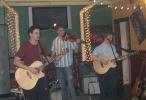
A 'folk concert' it said on the ticket and in the programme. A bit of an oxymoron - folk and concert, informal yet formal, born of the country but tied to the city. But let that pass.
Anyway Full Metal Waistcoat is a trio - Steve (fiddle rather than violin I guess), Vincent (guitar and singing) and Nick (guitar, singing and a metal recorder!). They now live and work around Oxford. I imagine they were all born around about 1983. So part of the puzzle is why is so much of their repertoire drawn from Steeleye Span and Fairport Convention circa 1972? Matty Groves, Crazy Man Michael, John Barleycorn, Blackleg Miner were all part of a brisk 45-minute set.
Either these young men have impeccable taste or a small record collection inherited from Cropredy Festival-going parents. If the former it is still pretty brave to take on songs that are likely to be so dear to the audience.
Within the limits of their instrumentation and voices Full Metal Waistcoat manage to deliver their own take on these tunes and don't offer mere copies and you aren't left waiting for Sandy Denny's purer tones.
So, all-in-all Full Metal Waistcoat is disappointingly good. Would they expect anything more in the way of compliments? Each of them has a full head of hair, single chins and easily get into 32" waist jeans. They are witty, assured and carry a tune. There was some evidence that they had rehearsed - can that count against them? But then it was a concert.
Anyway, they've come and they've gone and most of you missed Full Metal Waistcoat. Watch out for them if you are in or around Oxford. If you're lucky they'll be back next year and may be allowed a bit more time. Maybe they can steal some newer CDs in the meantime to update the set - though the songs are a couple of hundred years old anyway I suppose, no matter whose version you use.
Keith Savage
Celloscope - From Bach to the Beatles - A Cello Extravaganza

Ever heard 4 celli playing together, by themselves? 5? 9? 24? All this and more, including these instruments being used as percussion and the bass line ballast for South American dance music, were on show tonight in this hugely entertaining and frequently surprising show which lasted for nearly 2 ½ hours.
Celloscope consist of 5 cellists who all play with either the Halle or the BBC Philharmonic Orchestra, so the quality of the musicianship was guaranteed to be outstanding. They are a democratic outfit although tonight appeared to be led by Dale Culliford, and also included Melissa Edwards, Jane Hallett, Damion Browne and David Petri, and come from, or have studied in such far-flung corners of the globe as Glasgow, Amsterdam, Copenhagen, New Zealand, and, well, Chester. In the words of the programme, they decided in 2003 "to spend a few happy evenings with good food and wine exploring the repertoire for 5 celli". On tonight's evidence, it is our gain that they did so.
The cello is a warm and welcoming instrument - some liken it in some respects to the human voice. It is credit to the instrument's versatility that hardly any of tonight's pieces were specifically written for it, yet all sounded as if they could have been.
The 5 celli sang together not as one voice, but rather like a string quintet, with various players, usually Dale, identifying the main melody. The first half started with excerpts from Bach's "Well-tempered Klavier", performed in a slow and stately manner. Minus Damion, this was followed by two pieces by composers unknown to your reviewers, which nevertheless were early contenders for highlight of the evening. The first of these pieces was a sonata by Wagenseil, a contemporary and compatriot of Mozart's, lively and sprightly in its Rococco style; I particularly enjoyed the light touch of the "vivace" 4th movement. Although a century or so separated this piece from the next, Klengel's aptly named "Humoreske", no-one would have recognised the latter as the more modern work, as in style it was quite like it's predecessor, another lively piece in which the other players echoed Dale's phrases and which ended with a jolly pizzicato.
Once again augmented to 5, there followed one of Dvorak's well-loved "Slavonic Dances", in which Dale once again was charged with carrying the main melody. Next was a meditation from "Nobilissima Visione" by Hindemith, which Dale told us was from a ballet based on the life of St. Francis of Assissi, a dignified and thoughtful piece in which the players brought out the rich harmonies to great effect. Finally, if a German composer of South American dance music strikes you as strange, that was nothing compared to the funky bass riffs and percussion which were the high points of Kaiser-Lindermann's "Bossa Nova Philharmonica".
The players had run a Cello workshop during the day, consisting of 25 local youngsters (mostly) from the age of 8 upwards and ranging from beginners to grade 8, and who had been playing together for only 4 hours; it was ambitious, therefore, to devote the second half of the show to them, but very entertaining it was, each group playing a piece according to their ability and helped by a member of Celloscope. Clarke's "Trumpet Voluntary" opened proceedings in a slow and stately manner, followed by the rich tones of Haydn's "St. Anthony Chorale". Various players picked out the melody of Gilkyson's "Bare Necessities", which raised the biggest applause from the audience so far. The next piece, Hewitt-Jones' longer and Spanish-style "Serenade", a piece actually written for the cello, saw the players taking turns to perform more complex passages. Testimony to the quality of this group was that when Damion stepped forward to replace an absent student, the gulf in ability was not immediately evident. Finally, a highly proficient group accounted for Grieg's "Gavotte in old style"; the young Joe Donmall and Edie Langley did particularly well to keep up with such exhaulted company.
There followed pieces for bigger groups: the last group joined in with Celloscope to perform another and recently put together Kaiser-Lindemann piece, "Mambo", and all 24 players joined to perform a Brahms waltz, a Dr. Who theme tune which had much of the eerie other -worldliness of the TV original, "Run 2" by Bill Connor and "Yesterday" and "Ob-la-di Ob-la-da" by Lennon/McCartney, the first of which flowed remarkably smoothly and the second, as Dale said, sent us away tapping our feet. A fitting end to this remarkable concert in a warm, friendly, welcoming venue.
Ian Hamilton
Ruby Paul and Stan Graham - Both Sides Now: Ruby Paul and Stan Graham

Due to the entire population of Buxton's tendency to go bloomin' mental for Carnival Day, the turnout for 'Both Sides Now' was sadly rather low. However, this created an intimate atmosphere, which provided a haven from the hustle and bustle which seemed to have taken over Buxton in its entirety.
Both performers were clearly accomplished singer/songwriters and it was nice to hear two very different styles in one performance. There was some great on-stage banter between the two performers which was slightly reminiscent of a certain pair of mid-morning talk show hosts. However, the constant chatter on stage although informative did feel rather scripted and took away a little from the actual music. There wasn't much space left for the audience to decipher the meanings of the songs, which often is part of the enjoyment of listening to music.
It can always be hard to write a review, but that does become a little harder when reviewing two performers with such distinct styles. Thankfully, it was made easier by the fact that Ruby and Stan took turns in singing their own songs. Stan's music was very folk-oriented with a real leaning towards English folk in particular; it was narrative driven, and really mellow and relaxing. Ruby's music leant more towards popular/easy listening music and used techniques such as acrostics in her song writing.
All in all, Both Sides Now was a nice way to relax on Carnival Day, there was nothing too challenging in the lyrics or the music for a sunny Saturday afternoon. If it's nice music you're after, Both Sides Now is playing at the Barrel Room of the Old Hall Hotel on Sunday 15th from 3pm til 4:30pm.
Jasmine Harmer
High Peak Orchestra - Concert
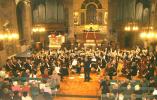
The High Peak Orchestra has now become a regular feature of the Fringe with a large following. So it was no surprise to find St John's almost full with enthusiastic supporters for an interesting programme.
The concert opened with Glinka's overture to Russlan and Ludmilla. The orchestra launched themselves into this well known work with tremendous energy creating a truly exciting introduction. A complete contrast followed with the Sinfonia Concertante by Mozart with soloists Louise Carter and Andrew Hodkinson, surrendering his baton to the Principal Horn, Patrick Grundy-White. It was a most sensitive performance with particularly fine playing by the soloists in the enchanting second movement bringing out all the subtlety of Mozart's composition.
And then a real treat, Shostakovitch's 10th Symphony. This is a marvellous work and one which places great demands on players. It is, perhaps, the most difficult piece this orchestra has ever tackled. But the orchestra and conductor rose to the challenge magnificently giving probably one of their best performances. The audience loved it.
Congratulations also to the programme designer who had provided extensive and very helpful programme notes including an extraordinary photograph of Shostakovitch in a fireman's helmet!
P.L.
Gemolade Vocal Group - Music Past & Present

Gemolade - Not as one may imagine, a mixture of Germoline and Marmalade, Certainly not, this product leaves a 'slightly' better taste in the mouth. Tonight's performance was given by four fifths of the act. The fifth member, it was mused had prior knowledge of venue and feigned an incurable case of miximatosis or some such to avoid this 'challenging' gig.
Gemolade consists normally, of five excellent vocalists who can sing a wide variety of popular numbers from the 1950's to the present, using good quality backing tracks. Not high art admittedly, more like karaoke on steroids, but much better than your average disco. During the first two numbers the singers shared their stage with a gaming machine, and the pool table was right in front of the stage. This was however moved later to one side to create a dancing space. One of the locals asked for the band to move a speaker so he could get a better view, which they graciously did. It had not occurred to this gentleman that one could actually move away from the bar!
The first of our dancers was blind drunk and insisted on vocalising vociferously and throwing shapes like a gibbon with rickets. He was joined by his drinking partner who lurched in a less than graceful arc across the floor and became helplessly wedged between the juke box and the now parked pool table. He was assisted by the stoic landlady who extracted him from his predicament and promptly ejected him. The scene then descended into what can only be described as something akin to a painting by Bruegel. The band to their credit showed a professional approach to their performance and a tolerant face to the 'audience'. The reviewer beat a hasty retreat after the first hour fearing some terrible disfiguring trauma. Now pass the Marmite.
Mark Flett
Kim Edgar - Kim Edgar: live acoustic set
The Scottish lilt of the beautiful Kim Edgar positively smoulders under Barrel Room's low brickwork arches. This singer-songwriter, well established on the folk circuit, makes her debut appearance at Buxton this year and is set to become a firm favourite. Her singing is self accompanied on guitar and keyboard and both her playing and singing are notably accomplished.
Kim's material is somewhat melancholic. This is not achieved through the songs' lyrics but rather through what can only be described as the songs' mood. Lyrically, some of Kim's best work comes when she is attempting a narrative in a song. For example, House on the Hill written in collaboration with Emma Pollock which discusses the mysteries of coincidence.
Kim's manner was a winner with the listeners. She introduced her songs with a bit of background and seemed generally interested in the audience's response to her questions. With a new album due out in January 2008 and a growing fan base, Kim's success can surely only grow!
Dale Copley
Hojo - Music from the heart
Last year we gave Hojo a Fringe Award as "The Spirit of the Fringe". Not a big-money prize just a recognition of someone we liked and valued and Free entry to this year's Fringe. Neat eh? That way we get to see him twice.
Hojo didn't quite manage to enter the Fringe as it happens (he's an artist you know) but that didn't stop him turning up. And sure enough he's appearing in five places officially - and randomly almost anywhere in town. You may come across him busking down Spring Gardens, or in gigs in the Barrel Room under the Old Hall (Thursday), The George (Friday), the Fringe Float in the Carnival Parade (Saturday), The Eagle (Sunday) and no doubt more will surface. Best of all he'll be here for the End of Fringe Party (but that's private, you'll have to bribe yourself an invitation).
Hojo is a lovely finger picking guitarist at his best in his own compositions and songs. You will be astonished that someone so accomplished can be so diffident. Last night (Wednesday) in the Barrel Room he was accompanied by his friend Jim on the violin, a similarly talented musician who found beautiful middle European voices in his fiddle. Sadly Jim has moved on but I hope to persuade him back for the party.
If you see Hojo anywhere say hello, maybe buy a CD (only £5 - a bargain) and welcome him to Buxton. The town is richer for his presence.
John Wilson
Accordes - Renaissance and Baroque Lute Songs
Accordes are very much regulars at the Fringe by now - and there is always a danger that they will be taken for granted and that would be a great shame.
Happily, a good-sized audience turned-out to enjoy this year's offering.
The Methodist Church was a different venue than in the past and Accordes were reduced in numbers by one-third - it was left to Holly Marland (mezzo soprano, lute & recorder) and Roger Child (lute, baroque guitar & theorbo - 'google' that one for a picture) to carry the flag.
It is rare for Accordes to repeat themselves in terms of repertoire and Roger Child researches energetically for 'new' tunes and songs. This year the newest material was a couple of Purcell songs - about 320 years old. The repertoire is drawn from Western Europe - Britain, Spain, Italy and France and much of it goes back to the 15th century.
Much of the lute/song repertoire has a melancholic air about it - and songs about lost or unrequited love seem to exist in all languages. If that makes it sound like a dolorous experience then that would be a mistake. The songs and music may at times be wistful and allow for reflection, but the grace and artistry of the performances can only leave the listener charmed.
Accordes hope to be back next year - perhaps in St John's Church. The Methodist Church offers an intimate setting and suits Accordes well, however - make the effort catch the bigger 'sister' group Partita on July 18th at the same venue.
Keith Savage
Tideswell Male Voice Choir - Tideswell Male Voice Choir in Concert
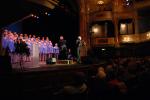
It is an incontrovertible fact that music is good for the soul. After witnessing the Tideswell Male Voice Choir's concert in St. John's Church with its excellent acoustics, it is evident that singing must also be good for the heart, lungs and memory. Where else would one find a group of three dozen upright men including at least one octogenarian standing for a couple of hours "bustin' their hearts with melody"?
The audience was treated to perennial favourites - The Rose, When the Saints Go Marching In, American Trilogy - and an offering from the more recent "Les Miserables", Bring Him Home" with its sensitive tenor solo.
Musical Director Dennis Kay took an unusual approach to the evening's delights by demonstrating to his appreciative listeners how a Tuesday evening's rehearsal with the Choir might go, even to the extent of inviting their participation in Jerusalem (yes, that one) and a lesson in diction with Let there be peace on earth.
It is easy to see how the Choir came to be awarded the silver trophy in the Male Voice Section of the 2003 Malta International Choir Festival. The rich baritone support for the soul-stirring harmonies in Jerusalem (no, not that one, but W. Walker's air from Dennis Kay's Salvation Army background with his twin brother) was glorious.
This reviewer's delight knew no bounds when the concert finished with the arrangement by internationally well-known Gwyn Arch OBE of the stirring African Trilogy, sung so sensitively that one young lady in the front row was reduced to tears.
Much credit must also be given to Llinos Hodgson on the piano who has so skilfully accompanied the Choir for 23 years. She confessed that she had never before played under a large umbrella as occurred when some of the Choir gave a taster last Sunday outside the Pavilion.
It was perhaps unfortunate that with such a rich choice of events in the Festival and the Fringe concurrently, the opera audience across the road could not also applaud this most professional Choir under their charismatic Musical Director. The Choir's Gala Concert with Aled Jones at the Buxton Opera House on September 1st is almost sold out, but they give numerous performances in the surrounding area. Make a point of hearing them.
Juliet Widdowson
Yorkshire Music - Sam Dunkley
Sam Dunkley is a hugely entertaining performer, a classically trained singer whose voice, unaugmented by amplification, filled the Barrel Room. He accompanies most of his repertoire of classic folk songs, his own material, and even one by Pink, on the keyboards, giving the melodies a freshness and originality. Occasionally he departs from this to play the more rhythmic songs on the guitar and here is equally effective.
However good the musicianship, the key to a live performer is his relationship with the audience. If a performer can't get that sort of interaction going, you might as well stay at home and listen to the CD. Sam Dunkley has a unique personality that immediately engages the audience in the best folk club tradition, a humorous raconteur and natural storyteller whose personality shines through his material.
It was a pity that the audience on this occasion was so small. I urge anyone to go and see his remaining concerts to witness an enormously talented musician and singer and an engaging personality.
Robbie Carnegie
Umdumo Wesizwe - Nqi Ngco
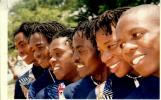
Jive Sinjonjo by Siyaya - Sunday 8th July 1pm
The long awaited Buxton debut of Zimbabwe's Umdumo Wesizwe accapella singing group performing Ngi Nigeo who were scheduled to perform in last year's fringe has been delayed by another week due to visa difficulties. The Underground Venue organisers are optimistic that we will hear their 'mesmerising harmonies' next weekend when they will perform on17th & 20th in the Barrel Room.
Meanwhile, their Zimbabwean colleagues Siyaya Arts ably filled the gap with a largely instrumental marimba concert of African music. This talented group of five men and one woman overcame the poor acoustic of the low ceilinged Barrel Room and the British reticence of the audience with their zesty energetic upbeat music.
Siyaya used three different sizes of home made marimba (a sort of wooden xylophone), two drums, and shekere (beaded gourd shakers) to re-create lively African dance music. The rhythms were so infectious that they even managed to get some members of the audience up dancing. I had previously thought of marimba as Caribbean or Calypso but this was definitely the instrument in its original African incarnation. The performers were enjoying themselves so much that they gave us an extra ten minutes at the end despite a fairly small audience.
Don't let the fact that this is a substitute put you off; this is real music making of a type that we don't get much of around here. Catch them this weekend then come back next weekend for their singing colleagues when they get here. If you are not sure you can see a video clip on www.undergroundvenuesd.co.uk/website where you will also find up to date information about the programme and ticket information.
Jean Ball
James Rippingale - Classical Guitarist - Guitar Recital

The banner behind James Rippingale, the first classical guitarist to give a recital at his namesake's church, read: 'Be still...' His appreciative audience on 7 July needed no urging. You could have heard a pin drop throughout the entire performance as James took them on an enchanting acoustic journey from the hymn-like 'Tibetan Prayer Song' by Ben Verdery, with its dramatic outburst of percussion, to the delicate harmonics of Yuquijiro Yoch's 'Sakura Variations.' The Sakura, or cherry blossom, is well-known in Japanese art and verse as a symbol of the ephemeral in life, and as James drew out the haunting melody of the folk song, you could have heard the petals of the blossom gently falling.
James' careful attention to the dynamics of this piece, as to all the others in his recital, was admirable, and the beautiful acoustic of the soon-to-be-designated St James Arts Centre served him and his Pete Barton guitar well. The different tones he coaxed from his instrument - full and resonant in the bass, and clear and sparkling in the treble strings - and the different rhythms he explored, including some dramatic bursts of Flamenco playing, showed James' wonderful versatility and perfectly loving rapport between him and his instrument.
James Rippingale has been playing the guitar since he was 10 and, having graduated from the Leeds College of Music, is already well on the way to becoming a consummate professional. His choice of pieces made for a varied and captivating programme, with an enjoyable mixture of his own well-crafted compositions, classical composers (Dowland's 'A Fancy,' a Bach 'Prelude,' and two Scarlatti sonatas) and contemporary: the lyricism and melodies of American composer Lou Harrison. Andrew York's 'Sunburst' (another American composer) with its fast fingering and jazz-rock-derived rhythms made a fitting and energetic finale.
James always introduced the items in his programme in a relaxed and confident manner (although a little more voice projection would not have gone amiss), explaining clearly points of interest in the music he was about to play, and setting his audience at ease from the beginning. His delight in playing for us was evident with every rapturous applause he took from an almost full St James.'
This recital will be remembered for a long time by all those who were privileged to hear this young musician. There is a treat in store for anyone who has bought tickets for his Buxton lunchtime recital on Thursday 19th.
Dr. Roger Kendall
Underground Events - Don't Fret - The Chillout Sessions

Picture the scene, its 4AM, you've been to a throbbing disco, you've been shouting yourself hoarse to make yourself heard over a crowded dance floor, you may have had one too many voddies. So you leave club land a little the worse for wear, having some difficulty in focussing, you drop into the local gin-joint on your on your way home for a detoxifying Perrier and a slice, the band is playing a mellow set of ambient jazz and compelling rhythms, People are either slumped in comfortable chairs with eyes closed or talking in a quiet but animated fashion, either way it's a relaxing tonic to the relentless jungle pace of the evening.
...That was not the scenario here at the "Underground" venue but Cath' Johnson (Conga's and Cajon) and Liam Morson (keyboards) of "Don't Fret" could have been just that band in our daydream. So just send the kids to the park, put down the shopping bags for an hour, kick off your shoes, have a long cool one and simply drink in the sounds of the Chill out sessions. It's a massage for the mind.
Mark Flett
Sean McKenna - Sean McKenna
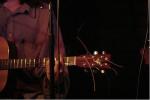
Sean McKenna's melancholic vocals graced a mixed repertoire, ranging from his own material to covers of The Beatles and The Smiths, from Irish folk to Delta blues.
His voice is at its most distinctive when in its upper register, or when more forcefully delivered. Unfortunately it was at these points that the PA system of the Barrel Room gave up the ghost, obscuring what might have been the most effective moments of this concert.
I think I would have preferred a bit more of a unifying character to this set, although the variety on offer certainly made for a good showcase of this able performer's work.
Robbie Carnegie
Underground Events - Lazy Lunches

It's a mark of the success of Underground Venues that it's become a place to simply hang out during the Fringe, day or night. Lazy Lunches furthers that cause, creating in the Barrel Room a relaxed atmosphere to enjoy a drink and food to the accompaniment of live music.
By its nature, such an event will be different every day, but the first lunchtime gave a good taste of things to come. Guitarist Aubin Vannes and vocalist Patricia Brown gave pleasing renditions of jazz standards to a small but appreciative audience. Aubin is a skilful jazz guitarist in the mold of Martin Taylor, while Patricia has a warm, friendly voice, particularly suited to the up tempo (Lullaby of Birdland, Paper Moon) and sassy (Peel Me A Grape).
Lazy Lunches are billed as a way to 'take a break from the heat' - they're a very relaxed and enjoyable way of taking a break from the wind and rain too.
Robbie Carnegie